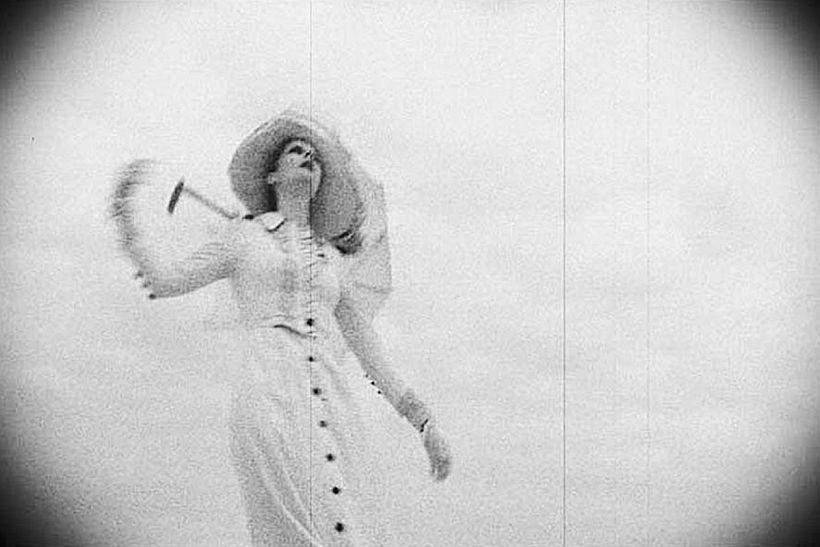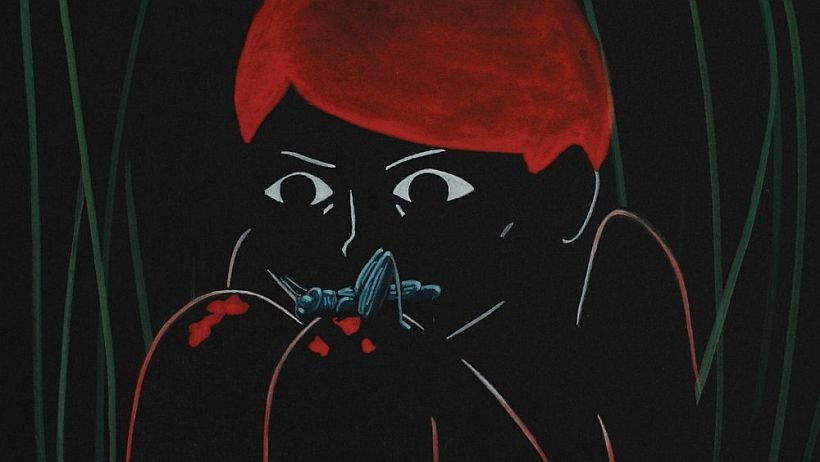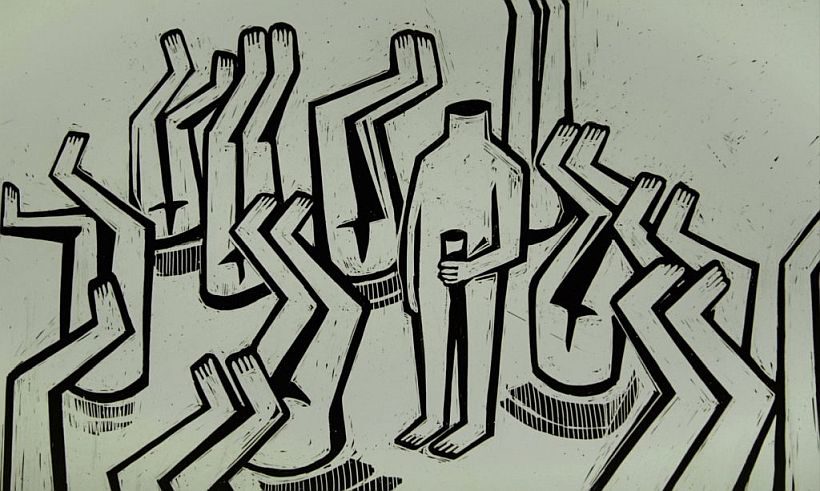
FRIEND OF A FRIEND (Zachary Zezima, 2019) © Sacrebleu
Ron Dyens first became known with his short film “La Flamme”. In 1999, he founded his own production company Sacrebleu Productions. Following numerous festival successes over the last 20 years, since 2019 he has been a member of Academy of Motion Picture Arts and Sciences, which awards the much-coveted Oscars each year. Willy Rollé spoke with him about the differences in short film production between France and Germany.
W.R.: As a producer, you’ve achieved success. “L’heure de l’ours” from Agnès Patron was one of just two French entries in the short film competition at Cannes in 2019. “Friend of a Friend” from Zachary Zezima was screened in Annecy in 2020. “Gros Chagrin” from Céline Deveaux won the 2017 Golden Lion in Venice. Why and how did you become a producer?
R.D.: I became a producer by chance. I never trained to become a producer, nor studied it either. I come from the art and literature scene. I did once write a theatre play. Which a producer read and asked me why I didn’t turn it into a short film. But at that time, I simply didn’t grasp what he meant. So he explained to me what a short film is and offered to produce it for me. “But before we start, he added, you could work for me for free, so you’re able to gain a clear impression of the film industry.” After two years of unpaid work, he admitted that he’d never produce the short film with me. “But I do want you to keep on working for me like you’ve done up to now.” With that, I left his company.
But, as luck would have it, I had a car crash and my house got burgled. And with the money from the insurance, I founded my own production company “Sacrebleu” and produced my first film. It was a disaster. I did now have a company, but I was jobless and had made an unsuccessful film. So I found myself at a crossroads: Either I close down the company, or resurrect it. That was in 1999.

LA FLAMME (Ron Dyens, 2001) © Sacrebleu
W.R.: Was “La Flamme” your first short film?
R.D.: No, “La Flamme” was my first success, my own first successful film. We needed one day of shooting and a year of post-production for it. And it ran at more than 150 festivals. My first short film was really bad. That’s why I keep it well locked away.
W.R.: Why is your company called “Sacrebleu”?
R.D.: In German, the closest translation to it would be “my God!” or “upon my word!”. It’s a positive swearword. “Merde” – or “shit” – seemed too static to me. “Sacrebleu” means there’s a problem here and we’ll try to resolve this problem.
W.R.: What is your connection with Germany?
R.D.: With “La Flamme”, I got to know German festivals. And I maintain my contacts there, like with the Berlinale, FILMFEST DRESDEN or interfilm, for instance.
I’d like to intensify my relationships with Germany. Sacrebleu is itself not an animation studio, but I am setting up two studios right now: “Parangon” in Strasbourg and “Le Studio” in Marseille. The aim with Parangon is to promote and expand German-French cooperative efforts in the field of animation. A presentation of “Parangon” at the 2020 International Trickfilm Festival Stuttgart had been planned.
W.R.: Back to your beginnings: How did your first production come about?
R.D.: Basically, I was forced to become a producer. I founded my own production company because I couldn’t find any suitable producers. And I wanted to give writers what I myself had not gotten from the producers. The problem now is that I’m not able to look after myself anymore.
W.R.: Why are there so many short film productions in France compared to Germany and the rest of the world?
The short film culture is organised differently in Germany. The films have good presentation platforms. And thanks to Germany’s federal system, there are many important festivals in cities such as Leipzig, Dresden, Berlin, Stuttgart, Munich, Hamburg or Oberhausen.
In France, the festival scene or industry with its global reach has a more centralised structure: Clermont-Ferrand for short films; Annecy for animated short and long films; Cannes for films from the whole world.

L’HEURE DE L’OURS (Agnès Patron, 2019) © Sacrebleu
W.R.: Why is there a culture for shorts in France?
D.R.: In France, culture is generally welcomed. The short film culture is a component of the French identity, like Bollywood is part of India’s self-awareness. In other countries, different forms of culture are important. Short film belongs to France’s image both externally and internally.
Which is why the country’s a production-friendly site for making short films. There’s a lot of money available in France for short film productions. And one fundamental difference with Germany consists of the production structures, or the labour-law system of “intermittences” (temporary employment) for employees in the film sector, as well as in the audio-visual media and the performing arts.
W.R: By their nature, these “intermittences” – or short-term contract employees in the film and theatre sector – often work on productions that are limited in time. This permits the employers to use work contracts with predefined time limits for hiring artists or technicians as part of a production. And it’s why the workers from these socio-professional groups are able to receive unemployment benefits in the periods when they’re not working based on the number of hours they’ve worked and on an additional contribution they make.
R.D.: Exactly. In order to be able to claim these unemployment benefits, we have to have worked 507 hours over the last ten months. Which is why, thanks to this status, people are able to work on projects that interest them. We’re cross-subsidised by the state, so to speak.
W.R.:Which means that France has created a kind of ecosystem for the film sector.
R.D.: Right, and it’s not comparable with the so-called €1 per hour job model in Germany.
W.R.: How can you earn money with short films?
R.D.: If a film has a good run at festivals, you can win prizes. But the producer doesn’t get all of the prizemoney. You have to differentiate between film prizes and awards for the director, like at the Oscars. For instance, the award for the best movie goes to the producer, while the prize for the best direction goes to the director.
W.R.: So the production company is financed by the overheads and not by the festival prizes and awards?
R.D.: No, not only. There are many sources of money. If your film is well financed, then there are overheads there to transfer from one project to another one. And with the overheads, you can finance the development of the next film. Like in a phase between two films, for instance, when you’re not earning any money, but you still have to keep your company up and running, financially speaking. My team consists of five permanent employees. And I’ve no “intermittents du spectacles”. I have to find projects that work. My ongoing costs per month come to about €40,000, so I have to rustle up at least€600,000 each year to cover all my costs.
W.R.: In Germany, there are hardly any production companies able to live from producing short films. In France, the budget for a short film amounts to €100,000 on average.
D.R.: As I said, the overheads are not the only instruments that permit and facilitate a short film industry in France. When it comes to the production costs, you can’t make such sweeping arguments, because each film is a prototype. For instance, the estimated costs of a 2D short film amount to €10,000 to €15,000 per minute. And these estimates are already ten years old.
W.R.: Are there also further differences with other countries?
R.D.: In many countries, short films act as a steppingstone in order to make a long film after it. And if your short film is no good, then you change your job. But this is not necessarily the case in France. You can produce many bad short films here one after the other. And if your screenplay is reasonably well written, then you as an author can find a producer or funding somehow or other. You don’t have to have such a strong personality to be a director in France. And you don’t have to struggle much.
W.R.: Is that not a negative view of the French short film funding system? The G.R.E.C. organisation, for instance, holds short film workshops. With short film being defined there as a format for the education and further training of young, up-and-coming film talents. Can we apply this viewpoint to the complete French short film sector?
R.D.: The G.R.E.C. is a special case. The abbreviation stands for “Groupe de Recherches et d’Essais Cinématographiques”. Experimenting is explicitly supported here, and the gaining of new experiences encouraged. Young people explore and analyse film professions such as production, screenwriting and directing in special programmes here. You get money for doing so and you have to put together your own team to make your film. The films they create are mostly good because the projects are well selected in advance.
But in the various funding committees where the writer does not have to present their film project themselves, their own personalities are not to the fore. In these cases, money is basically awarded without having any high requirements. And not enough attention is paid to the personality of the project submitter. It’s important to have a good story, but it’s also important to know who is submitting and promoting this story. Every author would claim that they’d fight for this, but is it true? In France, the author cult is so strong, that they’re very well protected.
W.R.: How significant are film festivals for short film?
I’d prefer not to speak too much about this question, because we have to see what’s going to happen now after this quarantine period due to the COVID-19 pandemic. Right now, no festivals are being held. It’s a strange, blurred time. How will we react after it’s over? What impact will the online festivals have on the complete film industry? We’ll be able to see via quantitative evaluations how many viewers have seen how many films. But for that, only the viewer numbers and not the “quality” of the viewers will be considered. And questions will arise: Are there really people beyond the film sector who want to see these films? Are film festivals important for everyone, or are they more like professional specialist events, closed circles, where the industry keeps to itself in self-adulation and celebrates itself? It hard to foresee right now whether this phase will develop positively or not. Every change in irritating at first. And there’s a risk that people will get used to moving around less in order to see and gain filmic content. And that won’t just have consequences for the short film industry.
W.R.: How would you define your work as a producer?
R.D.: I seek out. I read, I look at a lot of stuff, I listen, and I talk to people. Which is very time consuming. At the start I got nothing back from this: I was one company among many. But because I’ve achieved success now, I get more and more projects sent to me. But I’m not the type of person who’d grab the authors away from other producers. If a writer would like to change a producer, I’m happy to talk about it and see what comes of it.

GROS CHAGRIN (Céline Devaux, 2017) © Sacrebleu
W.R.: Do you yourself take care of the distribution and if so, which distribution channels (cinema, TV, VOD) are the most important ones right now?
R.D.: I take care of the distribution when it comes to my own short films. Which exploitation and distribution channels are the most important ones today? It depends on what you’re looking for. Television earns you money, but little visibility. Young people don’t watch television anymore.
There are huge differences in the festivals: The Berlinale, Annecy, Cannes are the biggest ones. Festivals are important for films, for writers and for producers. For the latter group because of their long, feature-length film projects. Because a producer who’s successful at festivals can go on to produce further films with the same author, or with another one. As a producer, it’s good to be a permanent guest at festivals. Our industry is based on work, credibility and reputation. And these elements have to be built up step by step: This helps you when you’re looking for money for projects. It’s not just a question of connections. Success does not happen by chance. Its festival successes show that Sacrebleu is a serious company. Because after a certain length of time, you can’t attribute these results to chance anymore. We’ve been in Cannes ten times, in Venice three times, and three times at the Berlinale. We’ve proven that we’ve got good taste, that we deliver good films. We’re not the jury.
Until 12 September, you can see “L’heure de l’ours” (The hour of the bear) by Agnès Patron on arte
1 Trackback